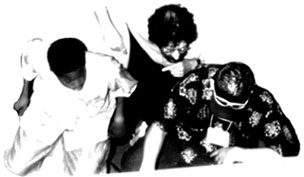Dedication
Introduction
Dan Ariely
Walter Bender
Steve Benton
Bruce Blumberg
V. Michael Bove, Jr.
Cynthia Breazeal
Ike Chuang
Chris Csikszentmihályi
Glorianna Davenport
Judith Donath
Neil Gershenfeld
Hiroshi Ishii
Joe Jacobson
Andy Lippman
Tod Machover
John Maeda
Scott Manalis
Marvin Minsky
William J. Mitchell
Seymour Papert
Joe Paradiso
Sandy Pentland
Rosalind Picard
Mitchel Resnick
Deb Roy
Chris Schmandt
Ted Selker
Barry Vercoe
Mitchel Resnick
I enjoy playfully inventing things that enable other people to playfully invent things—and, in the process, learning how to help other people learn.
I want all of life to be more like kindergarten—and I believe new digital technologies can help to make that happen.

Why kindergarten? As I see it, kindergarten is one of the few parts of our educational system that really works well. In kindergarten, kids spend most of their time creating things they care about: building towers out of wooden blocks, making pictures with finger paint, creating castles in the sandbox. As they playfully create and experiment, kids begin to develop new understandings: What makes structures fall down? How do colors mix together?
After kindergarten, education too often shifts to broadcast mode. Most schools try to deliver information to students, rather than allowing students to learn through creating, experimenting, and exploring. Unfortunately, as schools introduce computers, they often do so in a way that reinforces this information-delivery approach. That's not so surprising, given that most people think of computers as "information technology."
We need to move beyond these information-centric views of computing and learning. Instead, we need to start thinking about digital technology as a new material that (in the spirit of the blocks and finger paint of kindergarten) can expand the range of what people design and create—and what they learn in the process. Our goal should be not the Information Society, but the Creative Society, a world full of playfully creative people who are constantly inventing new opportunities for themselves and their communities.
In the Lifelong Kindergarten group, we spend part of our time developing new technologies to help kids design, invent, and learn. With our "programmable bricks," for example, kids can add behaviors to their LEGO constructions—and, in the process, explore ideas (such as feedback and emergence) that were previously viewed as too advanced for kids.
At the same time, we are exploring how these new technologies can enter meaningfully into the lives of kids and their communities. Working with Intel and the Boston Museum of Science, we have created a network of Computer Clubhouses, after-school centers for youth from under-served communities. The point is not simply to provide access to technology, but to help kids learn to express themselves creatively. Clubhouse members use new technologies to create their own animations, simulations, robotic constructions, and musical compositions—and then share their ideas and creations with others in the Clubhouse community.
There are now more than 60 Clubhouses in more than a dozen countries, from India to Brazil to South Africa. But scaling up isn't easy. Despite funding from Intel, Moore's Law does not hold for Clubhouses: it is very difficult to double the number the Clubhouses every 18 months, without a significant drop in quality. Seymour Papert has talked about the "epistemological dilution" that often occurs as new technologies move from the research lab to pilot project to widespread use. Indeed, spreading new ideas (and new ways of thinking) is far more difficult than spreading new technologies.
We are passionate about spreading the "kindergarten learning approach" to people of all ages, in all parts of the world. But we recognize that simply "broadcasting" our ideas will not accomplish much. Just as we need to move away from broadcast models of learning, we also need to move away from broadcast models for spreading our ideas about learning. For new ideas to spread and thrive, they must build upon ideas and practices that already exist in the local culture. As a result, new ideas are likely to take hold in different ways in different places. Finding ways to support and nurture that process is our biggest challenge for the future.
First computer: a mainframe at my high school, intended for administrative purposes, which I programmed with punch cards to play poker